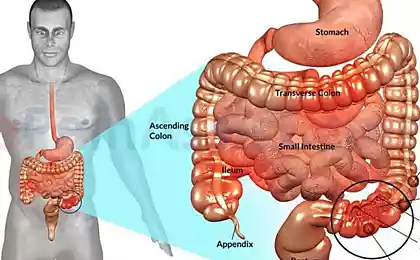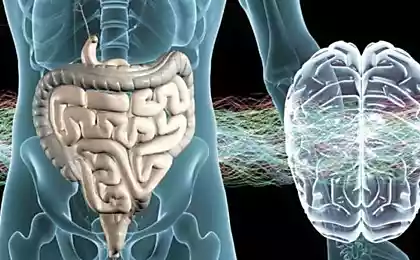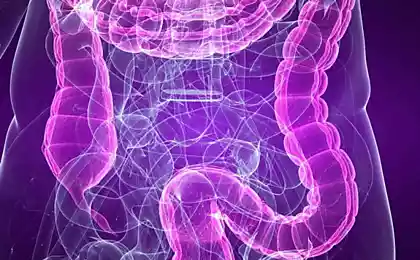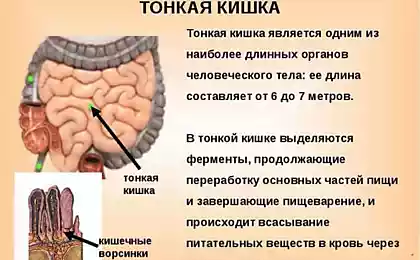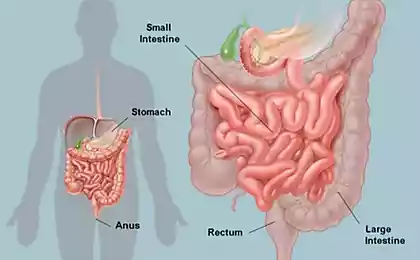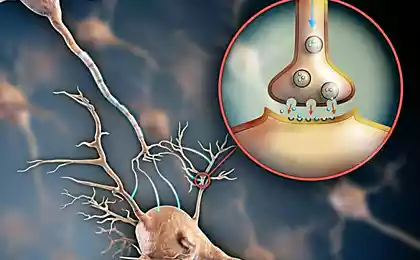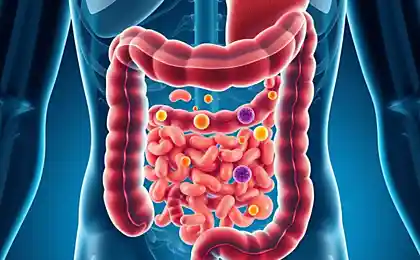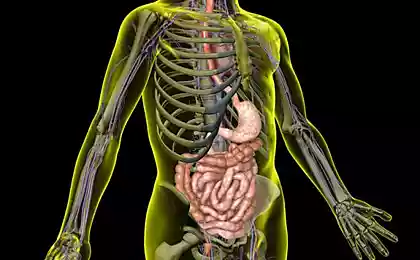1103
FOODMAP: Diet for irritable bowel syndrome
Irritable bowel syndromeWhat if the gut causes a multitude of unpleasant moments: pain, cramps, bloating, constipation, diarrhea... It's so exhausting that sometimes it seems that no strength to go on living.
Perhaps you've been to the doctors and after many tests, received their conclusion: irritable bowel syndrome (IBS).
What's next? Like living? Why bowel not working as it should? Stress? Food? The doctors say the exact cause is unknown and suggest medications that will temporarily reduce the symptoms. To cure the same, i.e. to find and eliminate the cause, doctors do not promise.
Ninety one million nine hundred ninety three thousand ten
But, whatever the cause of IBS, significantly improve the condition of the intestine is possible with properly chosen diet. There are a few diets. Depending on the severity of intestinal injury used one or the other diet taking into account individual peculiarities of the organism.
Today, take a look at one of these diets, popular in the States.
This special diet is called The Low-FODMAPs Diet, i.e. a diet low level of carbohydrates FOODMAP. Was developed in Australia, Monash University.
What is this diet? What is FOODMAP carbs? We know that all the products that we use in food include a variety of proteins, fats and carbohydrates. The authors of the diet claim that certain carbohydrates, when the food enter the digestive tract, cause some people irritation of the intestine. These are the carbohydrates was given the acronym FODMAP carbohydrates. If you remove these problem carbohydrates from the diet, symptoms of IBS will decrease.
Thirty six million twenty four thousand five hundred eighty
As part of the group, FOODMAP?
1. It is primarily, fructose — "sweet poison", according to Professor Lustig (or Lustig? — Robert Lustig, Sugar: The Bitter Truth on Youtube).
2.Lactose, which is a milk sugar contained in milk and some dairy products. Many people lose their ability to digest lactobacteria products. There is a lactose intolerance.
3.Sugar substitute (sugar alcohols mannitol, xylitol, etc.). These substitutes, poorly absorbed, and why they are allowed to diabetics, but their poor digestibility and causes irritation of intestines.
4. Fructans (fructans) is a special starchy carbohydrates are contained in onion, garlic, rye, wheat, asparagus, and many other products both natural and manufactured.
5. Galactooligosaccharides — a kind of carbohydrates, which are present in legumes.
In some products these FOODMAP carbs? What should be excluded from the diet? And what to eat?
In the English-speaking Internet on IBS sites you can find lists of the products as recommended, and those who need to abstain. Lists are updated from time to time, so the information is more recent than, say, books that were released a few years ago.
Below is one such list that contains a list of permitted products. Using these recommendations, it is possible to make for themselves the healing diet, in which after 10-14 days, it is possible to expect reduction of IBS symptoms. As always, a set of products needs to be slightly corrected for a particular person — we're all different.
What CAN I eat
Ninety two million one hundred seventy one thousand four hundred seventy two
Fruits:
bananas, grapes, cantaloupes, blueberries, cranberries, grapefruit, kiwi, lemons, tangerines, oranges, pineapples, raspberries, strawberries.
(Allowed fruits and berries eaten in limited quantities: one piece of fruit or a handful of berries.)
Produce:
Carrots, celery, cucumbers, potatoes, green beans, Chinese cabbage, broccoli (not everyone is perfect), peppers, eggplant and salad (not every do), olive, pumpkin, green onions (the pen, not the white part), spinach, tomatoes, zucchini.
(The onion is very irritate the bowel. It is recommended to avoid all types of onions and garlic, in addition to their greens. To avoid industrial products, which may have an onion or garlic — bouillon cubes, vegetable, dry mixes, sauces, soups, marinades, etc. to Give a taste of the food, using ginger, coriander, thyme, rosemary, mint, Basil, etc.)
Cereals and grains:
oats, rice, amaranth, quinoa, tapioca, millet, sorghum, buckwheat, sago, corn (not everyone is perfect), bread without gluten, milk from permitted cereals, pasta from the allowed grains.
Dairy produce:
melted butter, cheese (not every do), lactose-free milk, briey, camember, yogurt, lactose-free, feta, mozzarella.
Nuts and seeds:
almonds, macadamia, pecan, pine, walnuts, pumpkin seeds and sunflower seeds.
Meat and poultry:
lean meat, chicken, fish, eggs.
Sweetenings:
stevia, glucose, maple syrup, sugar.
(These sweeteners, though less irritating to the intestine than fructose, can only be used if mild symptoms of IBS. And it is better not to use them in the diet.)
Any Other Business:
coconut milk
Here is a list of products that are NOT recommended within FOODMAP diet:
Fruits: apples, apricots, cherries, pears, nectarines, peaches, plums, watermelon, fruit juices, dried fruits, fruits in jars Produce: avocado, asparagus, beets, broccoli, cabbage, cauliflower, garlic, onions, mushrooms, peas, okra Cereals: wheat, rye Legumes: beans, beans, lentils, chickpeas, peas Dairy: milk, soft cheese, yogurt, ice cream Sweetenings: fructose, high fructose corn syrup, sugar alcohols (xylitol, sorbitol, mannitol, etc.)
Is of great importance not only food selection, but as it is, and when.
The amount of food per day will be the same, but the body is easier to cope at once with a small volume of food.
Food should be simple. The combination of diverse products create an unnecessary burden on the digestive tract.
It is necessary to correctly combine foods. They should be compatible. published
P. S. And remember, only by changing their consumption — together we change the world! ©
Source: //www.horosheezdorovje.ru/1-dieta-fodmap-pri-srk/
Perhaps you've been to the doctors and after many tests, received their conclusion: irritable bowel syndrome (IBS).
What's next? Like living? Why bowel not working as it should? Stress? Food? The doctors say the exact cause is unknown and suggest medications that will temporarily reduce the symptoms. To cure the same, i.e. to find and eliminate the cause, doctors do not promise.
Ninety one million nine hundred ninety three thousand ten
But, whatever the cause of IBS, significantly improve the condition of the intestine is possible with properly chosen diet. There are a few diets. Depending on the severity of intestinal injury used one or the other diet taking into account individual peculiarities of the organism.
Today, take a look at one of these diets, popular in the States.
This special diet is called The Low-FODMAPs Diet, i.e. a diet low level of carbohydrates FOODMAP. Was developed in Australia, Monash University.
What is this diet? What is FOODMAP carbs? We know that all the products that we use in food include a variety of proteins, fats and carbohydrates. The authors of the diet claim that certain carbohydrates, when the food enter the digestive tract, cause some people irritation of the intestine. These are the carbohydrates was given the acronym FODMAP carbohydrates. If you remove these problem carbohydrates from the diet, symptoms of IBS will decrease.
Thirty six million twenty four thousand five hundred eighty
As part of the group, FOODMAP?
1. It is primarily, fructose — "sweet poison", according to Professor Lustig (or Lustig? — Robert Lustig, Sugar: The Bitter Truth on Youtube).
2.Lactose, which is a milk sugar contained in milk and some dairy products. Many people lose their ability to digest lactobacteria products. There is a lactose intolerance.
3.Sugar substitute (sugar alcohols mannitol, xylitol, etc.). These substitutes, poorly absorbed, and why they are allowed to diabetics, but their poor digestibility and causes irritation of intestines.
4. Fructans (fructans) is a special starchy carbohydrates are contained in onion, garlic, rye, wheat, asparagus, and many other products both natural and manufactured.
5. Galactooligosaccharides — a kind of carbohydrates, which are present in legumes.
In some products these FOODMAP carbs? What should be excluded from the diet? And what to eat?
In the English-speaking Internet on IBS sites you can find lists of the products as recommended, and those who need to abstain. Lists are updated from time to time, so the information is more recent than, say, books that were released a few years ago.
Below is one such list that contains a list of permitted products. Using these recommendations, it is possible to make for themselves the healing diet, in which after 10-14 days, it is possible to expect reduction of IBS symptoms. As always, a set of products needs to be slightly corrected for a particular person — we're all different.
What CAN I eat
Ninety two million one hundred seventy one thousand four hundred seventy two
Fruits:
bananas, grapes, cantaloupes, blueberries, cranberries, grapefruit, kiwi, lemons, tangerines, oranges, pineapples, raspberries, strawberries.
(Allowed fruits and berries eaten in limited quantities: one piece of fruit or a handful of berries.)
Produce:
Carrots, celery, cucumbers, potatoes, green beans, Chinese cabbage, broccoli (not everyone is perfect), peppers, eggplant and salad (not every do), olive, pumpkin, green onions (the pen, not the white part), spinach, tomatoes, zucchini.
(The onion is very irritate the bowel. It is recommended to avoid all types of onions and garlic, in addition to their greens. To avoid industrial products, which may have an onion or garlic — bouillon cubes, vegetable, dry mixes, sauces, soups, marinades, etc. to Give a taste of the food, using ginger, coriander, thyme, rosemary, mint, Basil, etc.)
Cereals and grains:
oats, rice, amaranth, quinoa, tapioca, millet, sorghum, buckwheat, sago, corn (not everyone is perfect), bread without gluten, milk from permitted cereals, pasta from the allowed grains.
Dairy produce:
melted butter, cheese (not every do), lactose-free milk, briey, camember, yogurt, lactose-free, feta, mozzarella.
Nuts and seeds:
almonds, macadamia, pecan, pine, walnuts, pumpkin seeds and sunflower seeds.
Meat and poultry:
lean meat, chicken, fish, eggs.
Sweetenings:
stevia, glucose, maple syrup, sugar.
(These sweeteners, though less irritating to the intestine than fructose, can only be used if mild symptoms of IBS. And it is better not to use them in the diet.)
Any Other Business:
coconut milk
Here is a list of products that are NOT recommended within FOODMAP diet:
Fruits: apples, apricots, cherries, pears, nectarines, peaches, plums, watermelon, fruit juices, dried fruits, fruits in jars Produce: avocado, asparagus, beets, broccoli, cabbage, cauliflower, garlic, onions, mushrooms, peas, okra Cereals: wheat, rye Legumes: beans, beans, lentils, chickpeas, peas Dairy: milk, soft cheese, yogurt, ice cream Sweetenings: fructose, high fructose corn syrup, sugar alcohols (xylitol, sorbitol, mannitol, etc.)
Is of great importance not only food selection, but as it is, and when.
- Six small servings are much healthier than three large portions.
The amount of food per day will be the same, but the body is easier to cope at once with a small volume of food.
Food should be simple. The combination of diverse products create an unnecessary burden on the digestive tract.
It is necessary to correctly combine foods. They should be compatible. published
P. S. And remember, only by changing their consumption — together we change the world! ©
Source: //www.horosheezdorovje.ru/1-dieta-fodmap-pri-srk/
The voice of conscience: If your conscience is telling you to leave, not stay!
Simple technique changes a bad scenario of life



